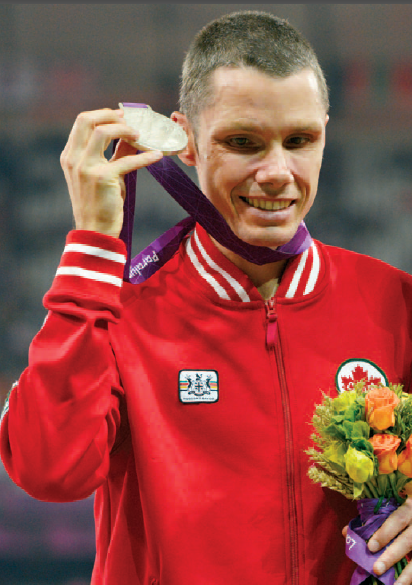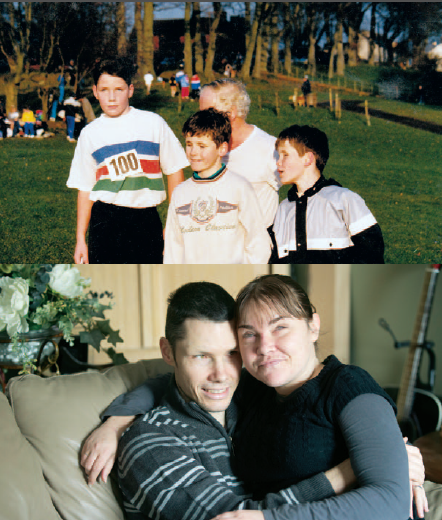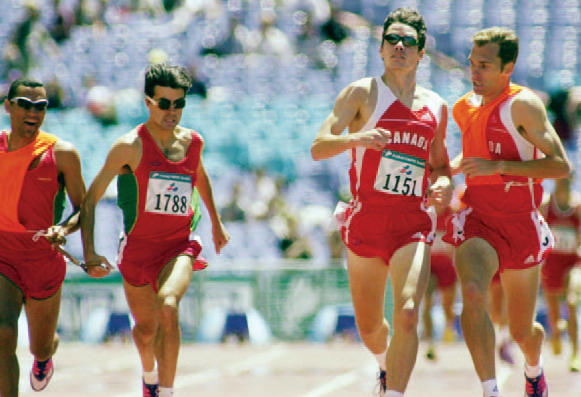This profile was originally published in the December 2013 issue of our magazine. By Martin Cleary
After a couple of days of disappointment in his only International Paralympic Committee track and field championships race in July, the visually impaired distance runner was able to put his shortened, hurried-up season into proper perspective. The end result on the track was merely a small personal defeat compared to the huge triumph he contributed to four months earlier on a hospital operating table.
Last winter, when he was training in Ottawa for the 1,500m and the 5,000m for the upcoming world championships, Dunkerley, 36, stopped completely and did something that would put months and years of work in jeopardy, as well as his life.
After receiving medical approval to be an organ donor, the nervous but upbeat runner went under the knife for two four hour surgeries. Doctors extracted a fully functioning kidney from Dunkerley on March 7 and implanted the organ into his wife Colleen Hayes to replace her two badly deteriorating kidneys and give her a second chance at a healthy life. Hayes, 34, discovered she had failing kidneys five years ago, when she travelled to Beijing to support Dunkerley, who was one of Canada’s standout athletes at the 2008 Paralympic Games. Hayes is also blind. She had full vision until 2000, but lost her sight because of diabetic retinopathy, which is a complication of diabetes that affects the eyes and can result in glaucoma and blindness. Her situation had become dire in recent years. She would now need a transplant to survive.
 Once out of the Ottawa Hospital, Dunkerley split his time between recovering from his own surgery and assisting his wife regain her health. As he became stronger, he started to think about what, if anything, would be next for him as a runner. He decided to challenge himself with a seemingly impossible goal: to qualify for his fourth IPC world championship, which was just months away. But Dunkerley and his coach quickly realized that he would not have enough time to safely pile on the mileage for his preferred longer distance events. He decided to tackle the 800m instead, a distance not totally suited to his liking at this stage in his career, but the only one that would legitimately give him a shot at the podium.
Once out of the Ottawa Hospital, Dunkerley split his time between recovering from his own surgery and assisting his wife regain her health. As he became stronger, he started to think about what, if anything, would be next for him as a runner. He decided to challenge himself with a seemingly impossible goal: to qualify for his fourth IPC world championship, which was just months away. But Dunkerley and his coach quickly realized that he would not have enough time to safely pile on the mileage for his preferred longer distance events. He decided to tackle the 800m instead, a distance not totally suited to his liking at this stage in his career, but the only one that would legitimately give him a shot at the podium.
Athletes at the IPC championships are divided into specific categories, depending on their physical disabilities. Dunkerley was born in Newtownards, Northern Ireland, without vision because of a rare inherited eye disease called Leber’s congenital amaurosis. Even though he is completely blind, he competes in the T11 class wearing either blacked-out sunglasses or a blindfold, along with his opponents, to ensure fairness. In the days preceding the T11 800m semifinal at the world championships in Lyon, France, Dunkerley had quality training sessions. He was confident, but cautiously optimistic. His workouts with guide Josh Karanja had to be reduced and Dunkerley’s training had to be crammed into an eight-week period following his major surgery. The qualifying window to make the Canadian team to the IPC worlds, which ended on June 17, was also closing fast.
He would have preferred to run the 5,000m, where he won the silver medal at the 2012 Paralympics in London. His second choice would have been the 1,500m, where he has won two gold, two silver and two bronze at the Paralympic and world championship levels. But, despite being fully fit before surgery, a six-week complete layoff after the operation and a restricted lead-up time to the world championships. He was forced to go with option three – the 800m.
Dunkerley has had success in the 800m – winning gold medals at the 2006 and 2011 IPC Worlds, as well as the 2003 International Blind Sports Association world championships in Quebec City. But in Lyon, he knew younger runners from Brazil, Colombia and Turkey would be coming fast.
Dunkerley embraced the challenge. He resumed training on April 16 with short periods of jogging, building up to 35 minutes of continuous running. A month later, he returned to regular track training with the Athletics Canada worlds qualifying deadline one month away.
“I didn’t want to take two steps forward and then three back,” Dunkerley said. “I had to be slow and careful. Being back at the track felt foreign, but I had great encouragement from Colleen,” said Dunkerley. “If I was to do this, the 800m was my best chance, but not my long-term focus. Being a competitor and having a challenge, I wanted to try for it.”
Ian Clark, who has coached Dunkerley for the past two-and-a-half years with the Ottawa Lions, took a careful but quick approach to training him in three areas – concentrate first on aerobics, then threshold and finally speed.
“My focus was to get him ready without putting him at risk,” he said. “We rushed a bit.”
Athletics Canada set two time standards for the T11 men’s 800m – an A-plus at 2:05.4, and an “A” at 2:15. Dunkerley ran 2:10 and 2:06 in his first two races in Ottawa. At the Canadian senior track and field championships and world trails, he placed first in 2:07. A week before leaving for Lyon, but after qualifying for worlds, he ran 2:05.78.
There were five runner-guide teams in Dunkerley’s semifinal. He would need to win his preliminary to advance to the final or post one of the next two fastest times. Dunkerley didn’t meet either condition. Dunkerley ran 1:01.62 for the opening 400m, when the target was 59.6. “I was flat on the day,” he admitted. “I didn’t have that gear to go faster.”
 Charging for the finish and sitting in second place, Dunkerley was passed in the final 15 metres by Christian Valenzuela of Chile, who finished in a personal best 2:06.03. Dunkerley’s season’s best 2:06.30 left him third. He needed the second-place finisher in the next semifinal to finish slower than his time. But Hasan Huseyi Kacar of Turkey ran a personal best 2:05.07 to gain the final berth in the final.
Charging for the finish and sitting in second place, Dunkerley was passed in the final 15 metres by Christian Valenzuela of Chile, who finished in a personal best 2:06.03. Dunkerley’s season’s best 2:06.30 left him third. He needed the second-place finisher in the next semifinal to finish slower than his time. But Hasan Huseyi Kacar of Turkey ran a personal best 2:05.07 to gain the final berth in the final.
“It was a bit tough, a bit of a blow. I felt I was in better shape than I showed. But that’s how it goes. It’s a bit disappointing. But in retrospect, I’m getting back this year, feeling good and healthy. I’m building for the future.”
“We felt anything was possible,” Dunkerley said. “It would be tough and tactical. There was no wiggle room. I felt I could run 2:03 or 2:04; my workouts were showing that. Once in the final, there were only four teams. I was excited. It didn’t quite go that way. That’s OK.”
For the first time in his racing career at the IPC world championships, Dunkerley wasn’t presented a gold medal, or any medal for that matter. Entering the worlds in July in Lyon, the Ottawa Lions Track and Field Club athlete only had stood on the top step of the medal podium – gold in the 1,500m in 2002, double gold in 2006 over 800m and 1,500m, and gold in the 800m in 2011.
Clark also was down after the race.
“If we had different tactics and Jason was feeling better, he would have made the final,” said Clark, who added he could have run 2:03 under those conditions. “When you feel flat, you don’t have that jump and it’s more of an effort to run.”
Despite what happened on the track, Dunkerley knows it was only a race. His major victory this season was giving a new life to his wife. And a fully appreciative Hayes continues to soothe the competitive Dunkerley.
“I’ve reminded Jason that while he feels great, the doctor told him it will be a year before he’ll feel 100 per cent,” Hayes said with a warming smile.
After experiencing his best-ever Paralympics in London – winning his first medal in the T11 5,000m, a silver; and his fourth straight medal in the 1,500m, a bronze – Dunkerley and Clark were ready to change their strategy for 2013 and aim for a fifth Games in Rio de Janeiro in 2016.
“We were thinking initially about making the 5,000m the focus. That was our planning,” Dunkerley said during a two hour interview in the comfort of their townhouse living room on a holiday Monday in early August. “Then things kind of changed.”
“That would be me,” quickly interjected a smiling Hayes.
During a visit to Beijing to support Dunkerley at the 2008 Paralympics, she became sick and was admitted to hospital for one week. Returning to Ottawa, she learned her kidneys were functioning at 25 per cent as a result of her diabetes, which triggered her blindness.
 Placed on a restricted diet and requiring regular blood tests, her kidneys nevertheless slowly deteriorated from 2008 until last fall. About a month after the 2012 Paralympics, where Dunkerley won a career-best two medals, Hayes’s kidneys suddenly and unexplainably began to fail. She started dialysis Nov. 8. It appeared Hayes would soon need a life-saving kidney transplant. Even though he it not certain that he would be an ideal candidate, Dunkerley immediately volunteered to donate one of his two healthy kidneys.
Placed on a restricted diet and requiring regular blood tests, her kidneys nevertheless slowly deteriorated from 2008 until last fall. About a month after the 2012 Paralympics, where Dunkerley won a career-best two medals, Hayes’s kidneys suddenly and unexplainably began to fail. She started dialysis Nov. 8. It appeared Hayes would soon need a life-saving kidney transplant. Even though he it not certain that he would be an ideal candidate, Dunkerley immediately volunteered to donate one of his two healthy kidneys.
The 2004 Ottawa male athlete of the year passed a battery of medical tests and was able to be a donor. That is rare, since most candidates come from the within the immediate family. While Dunkerley wasn’t a perfect match, and family and friends were ready to donate, doctors determined his numbers were good enough and both Dunkerley and Hayes were most comfortable with his decision. The two, four-hour surgeries on March 7 at the Ottawa Hospital by a surgical team led by Dr. John Mahoney went extremely well. “I’m left with one kidney, but I feel no different,” says a confident Dunkerley. He points out that the road to recovery with organ donation can be a bumpy one and is amazed by how smoothly their transplant has gone. “We consider ourselves lucky that we have been able to bounce back.”
Just five months later, Dunkerley and Hayes were back to their regular lives. Hayes has returned to her job as a sales rep at Gordon Group, a marketing and communications firm in Ottawa, feeling energetic, eating well and “running to the washroom a lot more,” she said. After a few weeks of rest to deal with soreness, they began a walking program, enjoying time together, before Dunkerley branched off to jogging and then running. “It was an amazing surgery,” a relieved Hayes said.
“I don’t think there was one setback. There was no blood loss and the surgery was great, just as they
hoped and expected.” With any surgery there were risks. Hayes was thrilled her husband was the donor, but she worried how it might affect his running career. So far, there has been no impact. “It went so smoothly you want to get back to normal quickly,” Dunkerley said. “By the next morning after the surgery I was taking a slow walk to her room
to talk with her.”
Fittingly, it was the 10th anniversary of their first date. In his hometown of Newtownards, population 8,000, he participated in many sports until his family moved to Hamilton, Ont. when he was 13. Right from the start, Dunkerley was taught to join in, be part of society and not let his visual disability hold him back. He was encouraged to be active and was never sheltered. He attended W. Ross MacDonald School for the Blind and benefited from its emphasis on sports participation. At school in Hamilton he developed his love of running, winning four 1,500m titles for the visually impaired at the Ontario Federation of School Athletic Associations’ track and field championships in the 1990s. When his school celebrated its 125th anniversary in the fall of 1996, he paid tribute in a special way by running 25 kilometres each day for five days. His mini-marathons raised $2,500 for the United Way.
As a student at the University of Guelph, where he received a degree in international development, Dunkerley wanted to experience being on one of the top track teams in the country. “I wanted to get better and I landed in an environment where people were a lot better,” said Dunkerley, who improved his personal best times to 2:01 for 800m and 4:08 for 1,500m. Off the track, federal government funding cuts cost Dunkerley his job as a program co-ordinator with Active Living Alliance for Canadians with a Disability. Dunkerley rebounded by deciding to
return to school for his master’s degree at the University of Ottawa.
Dunkerley is also working on a major change in his running technique. On the recommendation of Clark, Dunkerley has started running on the inside of his guide Karanja rather than on the outside. By focusing his training on the 5,000m, Clark believes Dunkerley could reduce his time by up to 15 seconds. That would make him a frontrunner on
the track in the upcoming Parapan American Games in Toronto, the IPC world championships in Qatar in 2015, as well as the Paralympics in 2016. “His whole racing career he has been on the outside of the guide. That’s were his technique and comfort zones were,” Clark said. “But he’s ready to adapt. That should save 10 to 15 seconds over 5,000m.”
When Dunkerley won his Paralympic silver medal in the 5,000m in London, he ran 15:34.07. The T11 world record was set in 2004 by Kenyan Henry Wanyoike at 15:11.07.
“We need to get back to that [2012 Paralympic] fitness level and go beyond, and by racing on the inside we figure we’ll be up with the world’s best,” Clark predicted. Hayes laughs when she’s asked about her sports career. Instead, she refers to herself as Dunkerley’s cheerleader. “With everything he approaches, he’s different than anyone I know,” she said. “He likes the challenge and he takes things on, but he never seems overwhelmed.
